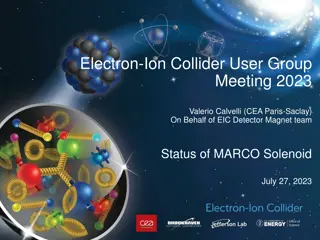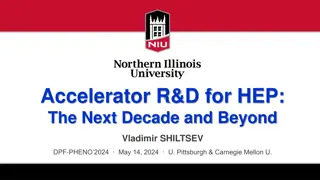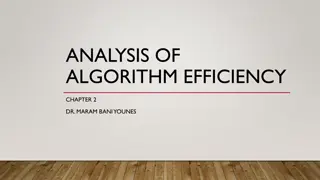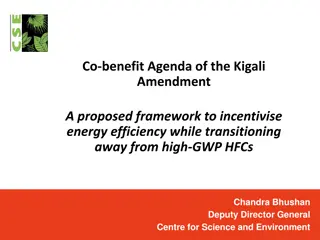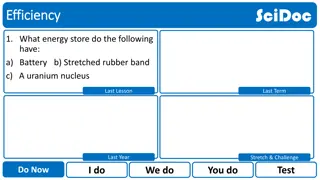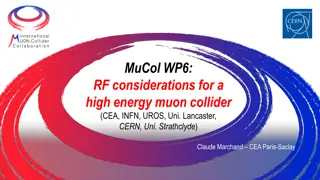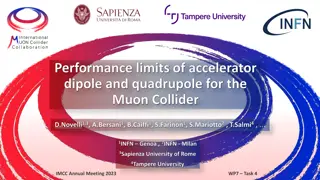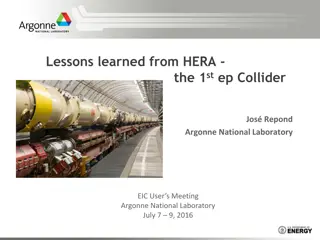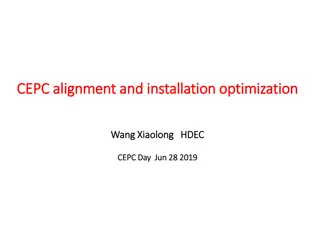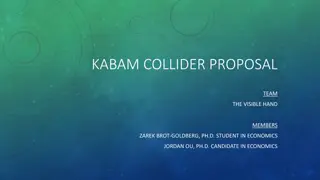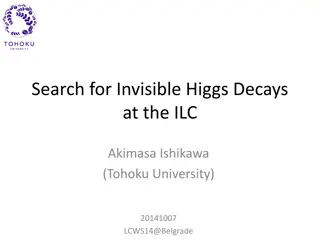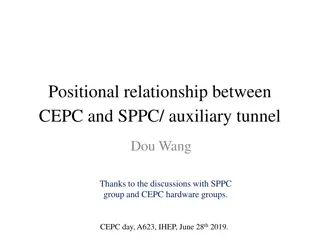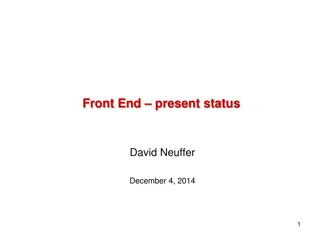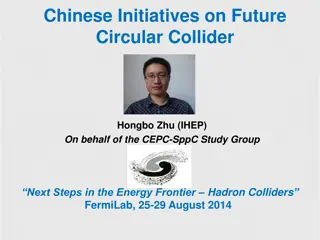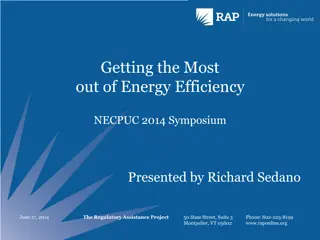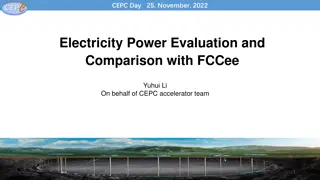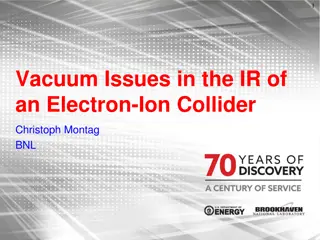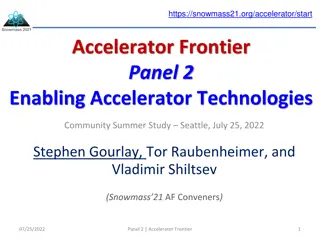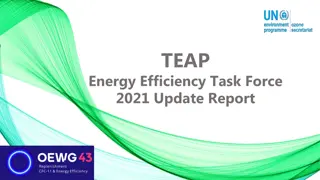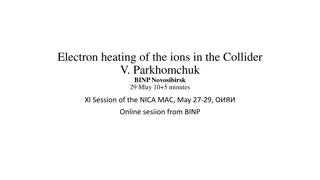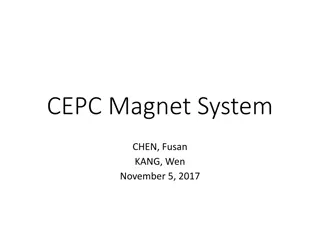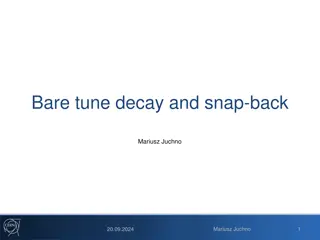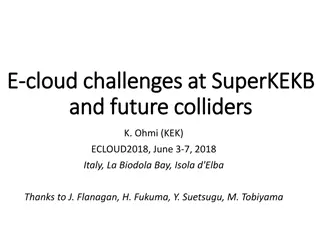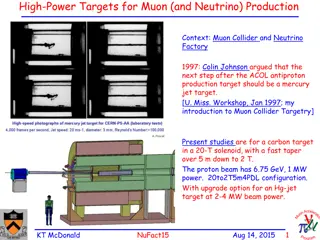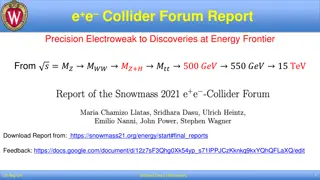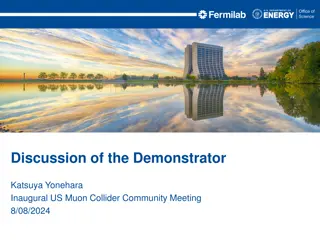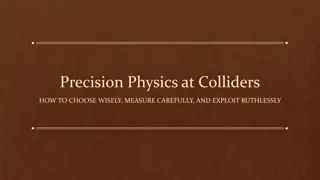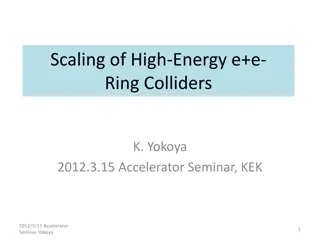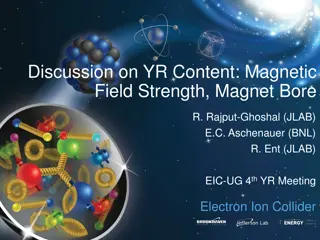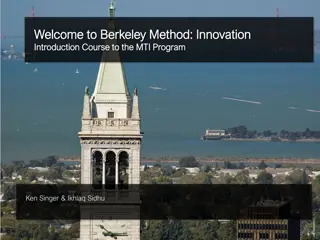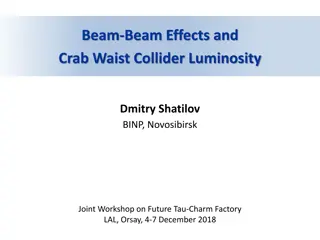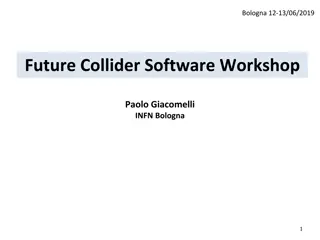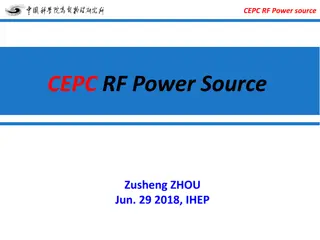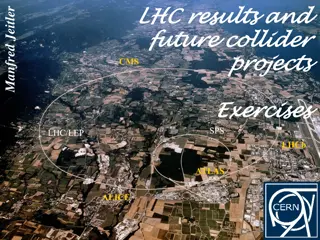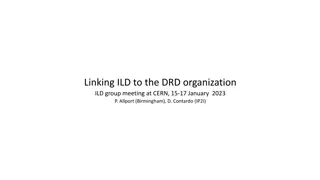High-Energy Recycling in E+ E- Colliders: Energy Recovery Linacs (ERLs) Advancements
High-energy recycling in E+ E- colliders involves the innovative concept of Energy Recovery Linacs (ERLs), pioneered by experts like Vladimir N. Litvinenko. These ERLs effectively recycle energy from collided beams, reducing energy consumption and increasing collider efficiency by maximizing luminos
1 views • 21 slides
Update on MARCO Solenoid Magnet Design for Electron-Ion Collider User Group Meeting 2023
Valerio Calvelli from CEA Paris-Saclay presented the status of the MARCO Solenoid magnet for the Electron-Ion Collider User Group Meeting 2023. The presentation covered an overview of the detector solenoid, magnet specifications, design status, cold mass details, and interaction length limits, provi
0 views • 21 slides
Accelerator R&D for High-Energy Physics: Advancements and Future Prospects
Vladimir Shiltsev's presentation at DPF-PHENO 2024 discusses the evolution of accelerator R&D in high-energy physics, emphasizing the need for off-shore Higgs factories and targeted collider developments. The P5 recommendations underscore the importance of engaging in feasibility studies for advance
0 views • 28 slides
Understanding Algorithm Efficiency Analysis
In this chapter, Dr. Maram Bani Younes delves into the analysis of algorithm efficiency, focusing on aspects such as order of growth, best case scenarios, and empirical analysis of time efficiency. The dimensions of generality, simplicity, time efficiency, and space efficiency are explored, with a d
1 views • 28 slides
Transitioning Towards Energy Efficiency: Co-Benefit Agenda of the Kigali Amendment
The Kigali Amendment proposes a framework to incentivize energy efficiency while phasing out high-GWP HFCs. Reports highlight the urgency to limit global warming to 1.5°C, emphasizing the need for deep emission reductions across all sectors. Investments in low-carbon technologies and energy efficie
0 views • 17 slides
Thermal Efficiency and Controls in Spray Dryers
Understanding the thermal efficiency and control factors in spray dryers is essential for optimizing drying operations in various industries. Factors such as inlet air temperature, heat exchanger efficiency, and solids content influence the overall efficiency of the drying process. Higher efficiency
0 views • 9 slides
Understanding Energy Efficiency in Devices
Energy efficiency is a crucial concept in understanding how well devices convert energy from one form to another. This summary covers the basics of energy stores, calculation of efficiency, and ways to improve efficiency in devices. Explore the different types of energy stores such as batteries, str
0 views • 15 slides
RF Considerations for High-Energy Muon Collider
This work package focuses on assessing feasibility issues and technological challenges of RF systems for a high-energy muon collider. Tasks include defining RF systems for acceleration and cooling complexes, addressing high gradients, beam loading, breakdown mitigation, and optimizing cavity distrib
0 views • 11 slides
Performance Limits of Accelerator Dipole and Quadrupole for Muon Collider
Utilizing Python code, the study analyzes the limits of accelerator dipole and quadrupole for the Muon Collider. Analytic formulas are implemented to assess the behavior of these components based on critical current density, operating temperatures, and superconductor materials. The study explores li
0 views • 17 slides
Insights from HERA Collider Experiments and Acronyms
Lessons learned from the HERA collider regarding its operation, detectors, experiments, and challenges faced. Acronyms like HERA, H1, ZEUS are explained, along with details on beam collisions and detectors used. Personal insights and caveats shared by a researcher who was involved in the HERA projec
0 views • 20 slides
Tasks of Alignment and Installation in CEPC Project
Tasks involved in the alignment and installation optimization of components in the Circular Electron Positron Collider (CEPC) project include control network construction, component installation, smooth alignment, and addressing any arising problems. The process is crucial for the successful operati
2 views • 19 slides
Optimizing In-Game Currency Prices for Greater Revenue: A Proposal by Kabam Collider Team
The Kabam Collider team aims to tackle Apple's pricing restrictions by implementing region-specific sales strategies and conducting A/B testing to estimate demand. They suggest adjusting in-game item prices instead of exchange rates, emphasizing revenue maximization through optimal pricing strategie
0 views • 21 slides
Exploring Invisible Higgs Decays: Insights from ILC and LHC
Investigating invisible Higgs decays plays a crucial role in unveiling potential signals of new physics, like Dark Sectors or Dark Matter. The search for invisible Higgs decays at the International Linear Collider (ILC) and the Large Hadron Collider (LHC) involves unique techniques such as recoil ma
0 views • 18 slides
Positional Relationship Between CEPC and SPPC for Accelerator Physics
The positional relationship between the Circular Electron-Positron Collider (CEPC) and the Super Proton-Proton Collider (SPPC) involves careful considerations such as bypass tunnels, compatibility for future e-P collision programs, and shielding in the tunnel. Various scenarios are discussed regardi
0 views • 8 slides
Current Status of Front End Systems in Particle Collider Research
David Neuffer presented the current status of front end systems for particle colliders on December 4, 2014. The presentation covered various aspects like baseline examples, beam characteristics, drift mechanisms, cooling methods, and simulation results. It provided insights into the operational mech
0 views • 15 slides
Advancements in Chinese High-Energy Physics Research
Initiatives like the CEPC-SppC Study Group and Circular Electron Positron Collider (CEPC) showcase China's commitment to pioneering future collider projects. With a focus on the energy frontier, developments such as the upgrade to a 50-70 TeV pp collider indicate significant progress in the field. T
0 views • 32 slides
Enhancing Energy Efficiency for Sustainable Development
This content covers a symposium on maximizing energy efficiency, presented by Richard Sedano at the NECPUC 2014 event. It introduces the Regulatory Assistance Project (RAP), a non-profit organization aiding government officials in energy and environmental issues with a focus on cost-effective energy
1 views • 27 slides
Comparison of Electricity Power Systems Between CEPC and FCCee
The evaluation and comparison of electricity power systems between the CEPC and FCCee accelerators reveal the power breakdowns, RF power consumption, magnet power supply, and overall power usage. Differences in power consumption for various components such as RF, magnets, and vacuum systems are high
0 views • 19 slides
Challenges and Upgrades in Electron-Ion Collider Interaction Regions
The article discusses vacuum issues, design challenges, and experiences in the interaction regions of Electron-Ion Colliders. It explores the unique characteristics of the HERA collider, including beam currents, bunch spacing, and straight sections. Additionally, it covers the upgrades and improveme
0 views • 25 slides
Future of Accelerator Technologies: Enhancing Colliders and R&D Programs
The Accelerator Frontier Panel discusses the crucial components to enable future accelerators, emphasizing the need for a National Future Collider R&D Program, General Accelerator R&D, and adequate accelerator and test facilities. The message stresses the importance of an integrated future collider
0 views • 17 slides
Addressing Energy Efficiency in Cooling Sector: 2021 Report Highlights
The 2021 update report from the TEAP Energy Efficiency Task Force emphasizes the critical nature of the climate emergency and the need to transition to lower GWP refrigerants and higher efficiency cooling systems. The report focuses on initiatives to enhance the efficiency of room ACs and refrigerat
0 views • 44 slides
Ion Beam Intensity Enhancement Through Electron Heating in Collider Experiments
The study discusses electron heating of ions in collider experiments at the Collider V. ParkhomchukBINP facility in Novosibirsk. It explores the effects of electron cooling on ion beams, ion beam oscillations, losses, and ion beam intensity enhancement. Various factors such as ion charge, classical
0 views • 9 slides
CEPC Collider Magnet System Overview
The CEPC collider magnet system comprises dual aperture dipole, dual aperture quadrupole, sextupole, and booster magnet designs. These magnets cover a significant portion of the 100km ring, addressing considerations such as manufacturing cost, power consumption, and field quality. The design focuses
1 views • 24 slides
Analysis of Tune Variation and Decay in Large Hadron Collider
This analysis focuses on the tune variation and decay of the bare machine tune in the Large Hadron Collider. It covers the evolution of the bare tune, analysis of the tune decay after injection, fitting of decay constants, and data extraction from 2015. The study includes insights into beam commissi
0 views • 16 slides
SuperKEKB: Advancements in Electron-Positron Collider Technology
SuperKEKB is a cutting-edge circular collider facility that aims to push the boundaries of high-energy physics research. From addressing cloud challenges to conducting instability simulations, the facility has made significant strides in understanding beam dynamics and electron cloud effects. The co
0 views • 32 slides
High-Power Targets for Muon and Neutrino Production
Colin Johnson advocated for a mercury jet target as the next step for muon production post-ACOL. Current studies focus on a carbon target with proton beam parameters optimized for muon generation. Carlo Rubbia discussed a potential Muon-Collider Higgs Factory concept at CERN, sparking debate on muon
0 views • 11 slides
Advancements in High-Energy Collider Technology and Discoveries
Explore the latest developments in collider technology, focusing on precision electroweak measurements and discoveries at the energy frontier. Reports highlight advancements in circular colliders, linear colliders, and the status of machine designs and risks. Key topics include luminosity, energy re
0 views • 19 slides
Advancements in High-Energy Collider Technology
The content discusses the development of Nb3Sn coatings to withstand high magnetic fields, potential cost reductions, and the importance of maintaining high Q0 to sustain maximum fields. Additionally, it highlights the advantages of using 4.2 K technology in cryogenic plants for increased efficiency
0 views • 6 slides
Developments in Muon Collider Technology at the Inaugural US Muon Collider Community Meeting
Discussion at the US Muon Collider Community Meeting highlighted advancements in muon accelerator technology, with a focus on the Demonstrator by Katsuya Yonehara. Key topics included the layout of the muon accelerator complex, achievements in ionization cooling, and the MERcury Intense Target. The
0 views • 14 slides
Precision Physics at Colliders: Choosing Wisely, Measuring Carefully, and Exploiting Ruthlessly
Precision Physics at Colliders explores the selection, measurement, and utilization of data at colliders, focusing on fundamental symmetries and parameters of the Standard Model. The lectures cover topics such as QCD, top, electroweak, and flavor physics, emphasizing the importance of precision meas
0 views • 42 slides
Scaling of High-Energy e+e- Ring Colliders and Proposed Parameters
Scaling of high-energy e+e- ring colliders has been proposed for energy levels exceeding 200GeV by various authors. The suggested collider possibilities include different tunnel configurations and collider designs. Common features for reducing synchrotron radiation include large circumferences and l
0 views • 15 slides
Insights on Magnetic Field Strength for Electron Ion Collider
Discussion on the requirements and advantages of different magnetic field strengths in detector solenoids at the Electron Ion Collider, emphasizing the impact on particle tracking, momentum resolution, and detector space needs. The analysis compares 1.5T and 3T fields, highlighting the implications
0 views • 9 slides
Exploring Innovation Through the Berkeley Method: Insights and Frameworks
Delve into the world of innovation with the Berkeley Method, focusing on preparing students for diverse innovation opportunities in the new economy. The program, led by Ken Singer and Ikhlaq Sidhu, introduces the MTI program and the Innovation Collider Model at UC Berkeley. Explore the Innovation Co
0 views • 9 slides
Advanced Techniques in Collider Physics for Enhanced Luminosity
Explore cutting-edge research on beam-beam effects, crab waist colliders, and luminosity optimization in collider physics. Discover how innovative strategies like crab waist technology and bunch crabbing mitigation are revolutionizing particle collision studies. Dive into the complexities of achievi
0 views • 10 slides
Exploring the Ethics of Efficiency in Economics Education
Delve into the intriguing discussion on whether efficiency is ethical in the realms of economics and education. This session, featuring the new Ethics, Economics, and Social Issues curriculum through EconEdLink, analyzes the concept of efficiency through diverse examples and engages participants in
0 views • 26 slides
Future Collider Software Workshop in Bologna
Hosted in Bologna, the Future Collider Software Workshop aims to discuss the need for a common software framework across different experiments at future colliders. The workshop addresses the challenges of adapting to new processors and detector geometries and explores the possibility of a common eve
0 views • 5 slides
CEPC RF Power Source Overview
The CEPC RF Power Source involves high-power RF sources for accelerating and stabilizing particles in the Collider system. It includes design elements, efficiency considerations, and operational cost impacts. The transmission system utilizes superconducting cavity technology to meet power demands ef
0 views • 24 slides
Unraveling Collider Physics: Investigations, Interpretations, and Accelerations
Dive into the world of collider physics with a focus on LHC results, future collider projects, and experiments from the Baikal Summer School 2021. Explore topics like invariant mass calculations, Higgs boson decays, particle acceleration in the LHC tunnel, and particle velocity considerations. Engag
0 views • 10 slides
Strategic Projects Alignment and Timelines Overview for DRD Collaboration at CERN
General considerations and key work packages linking ILD to the DRD organization, outlining the current assumptions on collider project timelines, typical technical and approval steps, and broad brush timelines for DRD collider projects. The content also highlights the DRD collaboration objectives a
0 views • 11 slides
EuroTeQ Collider 2022 and Circular Business Models
EuroTeQ Collider 2022 addresses challenges in the medical imaging industry, specifically for Siemens Healthineers, focusing on circular business models. The event discusses the current linear business model, three modules to circularity, and solutions for implementing economically feasible and susta
0 views • 8 slides

